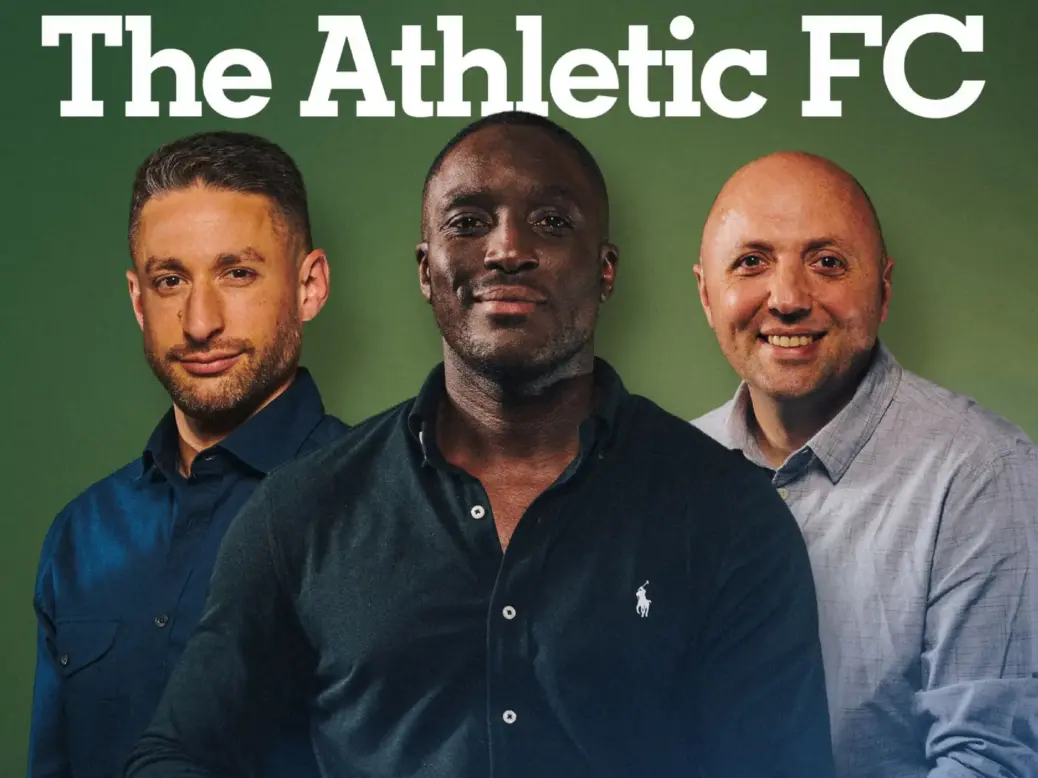
New York Times-owned sports publisher The Athletic wants its Athletic FC brand to be the most popular destination for ‘soccer’ fans in the US by the time the 2026 World Cup is hosted in the country.
The Athletic FC “universe” includes the flagship podcast by that name, multiple Premier League team-specific podcasts, a long-form Saturday video show on Youtube, short videos throughout the week and a daily email newsletter.
The first step is the rebrand of its team podcasts like Talk of the Devils (about Manchester United), Walk On (Liverpool) and Handbrake Off (Arsenal) under the Athletic FC umbrella. There are also plans to add more American voices over the next year.
The goal includes the Athletic FC portfolio of shows having the biggest US football (meaning soccer) podcast audience. A similar goal has not been set for video as The Athletic does not have broadcasting rights.
US interest spans the Premier League, Major League Soccer (MLS) and Lionel Messi at Inter Miami in particular, national games and American players at international teams like AC Milan.
The timing is ahead of an anticipated “surge of soccer fandom” leading up to the 2026 World Cup, which is being jointly hosted by the US, Canada and Mexico.
‘Leadership spot’ for football coverage in US ‘up for grabs’
The Athletic’s chief commercial officer Sebastian Tomich told Press Gazette he sees a “giant opportunity” for football coverage in the US because of a lack of competition both editorially and commercially.
He said: “The media landscape is just much less entrenched than other sports. As an avid fan you have Peacock, which has been the incumbent because of their rights in the US with Premier League, you have Fox with its international World Cup rights, you’ve got some individual franchises – I think there is some light coverage from ESPN and individual franchises like Men in Blazers, which have been around for a while.
“But we feel like the leadership spot is up for grabs, and we’re going to get it.”
Jesse Burton, The Athletic’s head of global audio, added: “You look at some of these established brands in the United States and they’ve been around, in many cases, for decades, and you look at who the soccer fan is the United States, and it’s a growing and younger demographic that’s coming into their adulthood and into the sort of prime of their fandom and that audience, we think, is up for grabs.
“We by far have the largest scale in terms of our newsroom and our access so it’s about reaching that audience and letting them know what we have, because we think that they’re ready for it, especially going into the World Cup.”

The news comes soon after Goal.com publisher Footballco began its own push into the US market with the appointment of its first CEO for North America, Jason Wagenheim. It has set its own target to be “the most definitive, important soccer media platform in the US come 2026” and is building a dedicated US editorial and commercial team.
The Athletic has 62 full-time football journalists globally producing more than 1,200 stories per month. Tomich added that “uniquely beyond our competitors, which I think tend to rely on pundits and individual voices, we can bring the power of a newsroom together to capture all that fandom in one place”.
Editorially, the team-specific podcasts have previously been run separately from The Athletic FC but Tomich said they will be brought together in almost a “broadcast model, where you’ve got your Match of the Day crew for BBC, and then you have the individual club shows”, meaning they will share talent more than before for the major moments.
Tomich added that there is also a “very big opportunity to cross promote Premier League coverage to fans of other sports… if we can just convert, let’s call it 10 to 20% of the NFL fans over to Premier League and global football, it will make a giant impact”.
The Athletic: Commercial opportunity for football will ‘skyrocket’
Commercially, Tomich said The Athletic wants football coverage in the US to “play a much bigger role in our business. Internationally, the opportunity is more established. In the US, I think it’s more nascent.
“You have brands who have naturally tied themselves to football over the years. You have your Guinnesses, which have showed up on Saturday mornings around Peacock, and you have a lot of the Fox World Cup sponsors, like your Cokes and your Hyundais and your Budweisers, that are tied to FIFA. But if you compare it to something like the NFL, it’s a really small industry.
“Our expectation is that’s going to skyrocket in the next year and a half. And in many cases, when you talk to the marketers who have been around for some prior World Cups, they’ll tell you that the US has no idea what’s about to hit it.”
There are a lot of stereotypes of football fans in the US, Tomich continued, for example that they don’t know the sport or they only follow Messi because he’s in Miami.
“Brands have a lot of education to go through over the next year just to understand soccer fans and get outside of some of the stereotypes… I’ve had conversations with brands questioning if it’s going to be a drinking event and I laugh and say ‘have you ever been to a football match in the UK?'”
Tomich added: “I don’t think it will be a leap to say that the next World Cup final will be the most-watched sports event in history… a lot of the brands that we talk to, I think they know it’s coming, and they know they have to make plans. They don’t know what to do yet, and we want to be there for them.”
Tomich, who worked at The New York Times in senior advertising positions for almost ten years before moving over to The Athletic in 2022 after the acquisition, said he had personally subscribed to the sports brand before then because of its Manchester United coverage.
“It was hands down the best Premier League coverage in the world, and so you just had to have it,” he said. “There’s hundreds of millions of fans of these big clubs around the world… a big portion of them are in the US, so our vision is to capture both interest in football, global soccer, with The Athletic FC, and combine that with the power of the interest in these big clubs.”
When The Athletic first launched its football coverage in the UK in 2019 it promised dedicated coverage for every Premier League club in the country.
However it has since begun to focus “more and more on the biggest clubs, the biggest stories, the biggest players”, Tomich said.
He described the growing Athletic FC brand as “a front door, both into coverage and the way we monetise it commercially”.
The Athletic monetisation: Advertising and subscriptions
A spokesperson for The Athletic said the website had 21.4 million visitors in the US in July according to Comscore.
They also said US downloads of The Athletic FC podcast were up 19% season on season and that eight of the publisher’s shows were in the top 20 of Apple’s US soccer charts.
Although The Athletic’s website has a hard paywall, its podcasts (and Youtube shows) are monetised by advertising.
The Athletic has 5.3 million digital-only subscribers, which includes stand-alone subscriptions and where it is part of a New York Times bundle, according to the latest figures from Q2 this year, up from 3.6 million the same time last year.
The Athletic’s advertising revenues were up 30% compared to the second quarter of 2023 to $7.1m (£5.5m) attributed to a jump in display advertising.
Asked if The Athletic has considered paywalling its podcasts like The Economist and some other publishers, Tomich said: “I think for this stage of our evolution, getting more brand awareness in the US is such a big priority that will prioritise large audiences but I wouldn’t rule something like that out in the future. It seems to be a natural evolution of every format.
“But in this case, our priority is to get to the most soccer fans as possible in the US and these universes like FC are the greatest brand campaigns you can ever pull off when they work.”
Email pged@pressgazette.co.uk to point out mistakes, provide story tips or send in a letter for publication on our "Letters Page" blog
